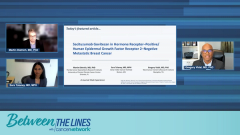
Article Introduction and HR+/HER2 mBC Background
Sara Tolaney, MD, MPH introduces the 2022 Journal of Clinical Oncology preprint publication, “Sacituzumab Govitecan in Hormone Receptor–Positive/ Human Epidermal Growth Factor Receptor 2–Negative Metastatic Breast Cancer” and invites Martin Dietrich, MD, PhD and Gregory Vidal, MD, PhD to comment on the typical patients with hormone receptor–positive (HR+)/human epidermal growth factor receptor 2–negative (HER2-) metastatic breast cancer (mBC) who they see in their clinical practice.
Episodes in this series

Dr. Sara Tolaney: My name is Sarah Tolaney and I'm a breast medical oncologist at Dana-Farber Cancer Institute today. I'm joined by two of my excellent colleagues, and we're going to be discussing Sacituzumab govitecan in hormone receptor-positive HER2- metastatic breast cancer. I'd love to introduce my colleagues. I'll pass it off to Martin to introduce himself.
Dr. Martin Dietrich: Hello, I'm Dr. Martin Dietrich. I'm a medical oncologist at the Florida Cancer Specialist & Research Institute at the University of Central Florida Cancer Center in Orlando, Florida.
Dr. Sara Tolaney: Thanks so much for joining us today. Gregory?
Dr. Gregory Vidal: Hi. I'm Gregory Vidal. I'm a breast medical oncologist at the West Cancer Center and Research Institute in Memphis, Tennessee. Thank you for inviting me.
Dr. Sara Tolaney: I think just to start off, it'd be helpful to think a little bit about how we're approaching our patients who have metastatic hormone receptor-positive breast cancer. Gregory, maybe you could start off and tell us how you would approach a patient in the first-line setting who's presenting with metastatic hormone receptor-positive disease just to give us some context of initial therapy approaches.
Dr. Gregory Vidal: Thank you very much for that question. Generally, I think it's widely accepted that a CDK4/6 inhibitor with an anti-hormonal therapy is a standard of care for first-line hormone receptor-positive. The antiestrogen partner is generally dependent on what the patient was on when they first progressed. Generally, if there is 12 months based on the study's interval, then an anti-estrogen therapy such as an aromatase inhibitor. If those patients progress while on aromatase inhibitor, faslodex plus CDK4/6. In the second line setting, it's not very well established as to what that line of therapy but options include a PI3 kinase inhibitor like alpelisib if that patient has a PI3 kinase mutation. We also have faslodex-everolimus combination in that sense. Generally, it is anti-hormonal therapies. At least we try to maximize that until we come to a point where we've run out of those options.
Dr. Sara Tolaney: Now, that's super helpful and really it's tremendous to see how much progress we've made in this space with CDK4/6 really now in truth extending survival for these patients. As you point out, we do run through the endocrine therapies a little bit faster now as I do find that, that time post CDK4/6 is a little bit shorter with endocrine treatment. As you suggest we're running through those endocrine therapies, then we are generally shifting towards chemotherapy. Maybe, Martin, I can pass it to you about how you think about a patient who's maybe endocrine-refractory and what you're thinking about when selecting treatments for that patient.
Dr. Martin Dietrich: Well, it's a big unanswered question. Obviously, I'm very happy about the opportunity to have additional therapy opportunities for patients available now, but how to sequence them and what the optimal sequence is, is going to be very challenging. I think aside from efficacy, we're going to be seeing considerations of side effects, convenience that may be playing a role here as well. Also depends on the nature of progression. If somebody had bone-only disease and has been doing very well for a long time on a CDK4/6 and then has a milder bone progression, I'm maybe thinking about a subsequent line of therapy with an mTOR inhibitor plus fulvestrant or a biomarker-driven next-line therapy with the PI3 kinase inhibitor combination. If that's not available then I think oftentimes the next step will be still the use of traditional oral chemotherapy of capecitabine. I think alopecia will be a very big argument here, but if we go by efficacy, I think we actually have better options now available. I think the antibody-drug conjugates here play a big role. In particular, when I have a patient that converts viscerally with a more aggressive phenotype and we actually see persistence of biomarkers here with HER2 expression based on DESTINY-Breast04 or in the setting of a non-biomarker selected setting with Trop 2 targeting, I think those would be very interesting options to utilize. A little bit is the question of label. Is CDK4/6 inhibitor considered a chemotherapy or is that a semantic extension? Do we really need to have classical cytotoxics prior to using one of the antibody-drug conjugates? Obviously, sometimes it's very helpful to ease the transition and utilizing an oral chemotherapy that doesn't have the impact of alopecia if a patient is progressing after a CDK4/6 inhibitor. If you would follow strict [00:06:00] biological principles of best therapies first, I think the use of antibody-drug conjugates would be a very early consideration, probably side by side with the taxanes here in the setting.
Dr. Sara Tolaney: That's very helpful. I think it's nice to see because prior to antibody-drug conjugates really entering the space, we were pretty limited in a sense that we were really moving from one single-agent chemotherapy to the other so I agree, I tend to use capecitabine too as my first chemo and then usually taxane if they haven't and then maybe something like eribulin. We've kind of been running through those lines of treatment.
Newsletter
Stay up to date on recent advances in the multidisciplinary approach to cancer.







































